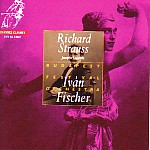If we chose to ignore all works about which their composers spoke disparagingly, the active repertoire would be half its current size. Indeed, 90 percent of Tchaikovsky’s finest music never would be played. So the fact that Richard Strauss found himself less than captivated by the subject of Joseph hardly means that the music is bad. It’s fully characteristic, mature Strauss. Because it’s a ballet, it has its share of padding, just as do contemporaneous pieces such as Daphnis and Chloe or The Firebird. For that reason, some listeners may well prefer the “symphonic fragment” that Strauss later arranged, which you can find in Kempe’s benchmark EMI orchestral music collection. Most listeners, though, will put up with the connective tissue in order to enjoy the music’s sheer opulence and color.
There really is only one other recording competitive to this one: Sinopoli’s on DG, with the Staatskapelle Dresden. Both are excellent, quite similar in terms of pacing (Sinopoli slightly quicker in a couple of places), and magnificently played. Sinopoli may enjoy a slight edge for his strings and winds, Fischer for the brass and above all for Channel Classics’ stunning engineering. But this really is nit-picking. I sat down with the score and followed both performances, and believe me, they are both wonderful. Given the ripe orchestration (four harps, piano, celesta, wind machine, six horns, contrabass clarinet, and lots of other ear-catching stuff), superior sonics may well prove the deciding factor.
There’s really no need to go into further detail. If you love Strauss and want to hear this music in all of its late-Romantic glory, then you absolutely must buy this disc. And whatever Strauss himself may have said, there is plenty of good music here. Ivan Fischer and his orchestra clearly believe in it, and I suspect that you will too.
































